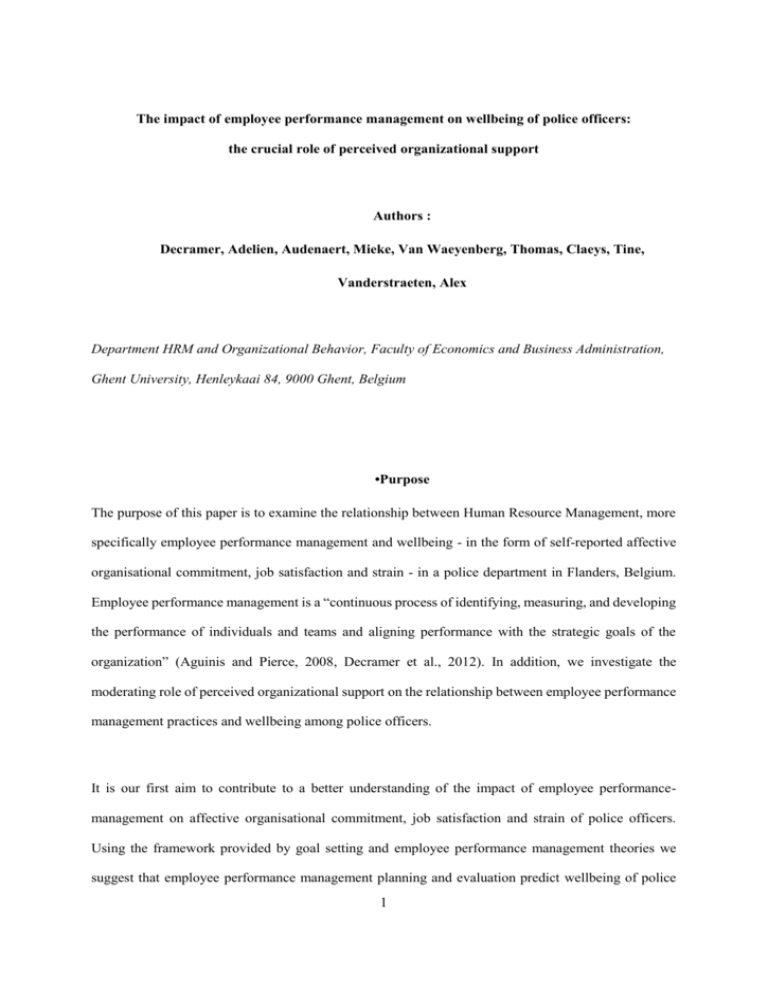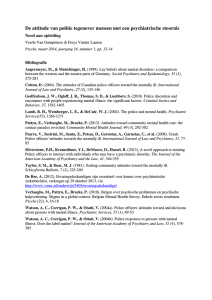The impact of employee performance management on wellbeing of
advertisement

The impact of employee performance management on wellbeing of police officers: the crucial role of perceived organizational support Authors : Decramer, Adelien, Audenaert, Mieke, Van Waeyenberg, Thomas, Claeys, Tine, Vanderstraeten, Alex Department HRM and Organizational Behavior, Faculty of Economics and Business Administration, Ghent University, Henleykaai 84, 9000 Ghent, Belgium •Purpose The purpose of this paper is to examine the relationship between Human Resource Management, more specifically employee performance management and wellbeing - in the form of self-reported affective organisational commitment, job satisfaction and strain - in a police department in Flanders, Belgium. Employee performance management is a “continuous process of identifying, measuring, and developing the performance of individuals and teams and aligning performance with the strategic goals of the organization” (Aguinis and Pierce, 2008, Decramer et al., 2012). In addition, we investigate the moderating role of perceived organizational support on the relationship between employee performance management practices and wellbeing among police officers. It is our first aim to contribute to a better understanding of the impact of employee performancemanagement on affective organisational commitment, job satisfaction and strain of police officers. Using the framework provided by goal setting and employee performance management theories we suggest that employee performance management planning and evaluation predict wellbeing of police 1 officers. We build on the demand-control model to expect that the employee performance management planning may result in increasing demands which challenges the wellbeing of the employee (Karasek Jr, 1979). The performance planning phase may result in increasing demands. The inherent work intensification may engenders an unfortunate effect on employees’ wellbeing (Van De Voorde et al., 2012). Our second aim is to study the role of perceived organizational support in the linkage between employee performance management and wellbeing. Perceived organizational support refers to employees’ perception of the organization’s commitment to them. It reflects employees’ beliefs about the extent to which the organization values their contributions and cares about their wellbeing (Eisenberger et al., 1986, Wayne et al., 1997). We build on organizational support theory to expect that employees with high perceived organizational support will respond more positively to employee performance management because they perceive that the organization supports them and protects their interests in planning and achieving their goals. We build on the demand-control model (Karasek Jr, 1979) to propose that perceived organizational support may function as a resource that enables employees to cope with the demands in the planning phase. •Design/methodology/approach The data were gathered using a structural questionnaire addressed to the employees from a Flemish Local Police Department which comprises specialised police services including crime reduction, traffic and tactical operations. This specific Flemish Police Department was chosen because of the large sample and variety of tasks and employees. The questionnaire was administered to the total police population of 1037 employees. The survey was developed based on a literature review and was subjected to pre– 2 testing and pilot testing. After a period of intensive follow-up, a 23,05% return rate was obtained. On receipt of the surveys, the researchers used the SPSS software to analyse the data. •Key findings - Research limitations/implications In a sample of police officers of the police department, we partly find support for our arguments. Employee performance management practices are associated with wellbeing, but the results indicate that these employee performance management practices have different impacts on affective organisational commitment, job satisfaction and strain. Employee performance management planning and evaluation of police officers are associated with attitudinal outcomes. However, the results show that different employee performance management practices have different impacts on wellbeing. Moreover, the findings in our research suggest that perceived organizational support plays a crucial role in transmitting the effects of employee performance management practices for police officers to individual well-being. Considering this crucial role of perceived organizational support, police departments may foster the development of qualitative HR departments. 3 References AGUINIS, H. & PIERCE, C. 2008. Enhancing the relevance of organizational behavior by embracing performance management research. Journal of Organizational Behavior, 29, 139. DECRAMER, A., SMOLDERS, C. & VANDERSTRAETEN, A. 2012. Employee performance management culture and system features in higher education: relationship with employee performance management satisfaction. The International Journal of Human Resource Management, 24, 352-371. EISENBERGER, R., HUNTINGTON, R., HUTCHISON, S. & SOWA, D. 1986. Perceived Organizational Support. Journal of Applied Psychology 71, 500-507. KARASEK JR, R. A. 1979. Job demands, job decision latitude, and mental strain: Implications for job redesign. Administrative science quarterly, 285-308. VAN DE VOORDE, K., PAAUWE, J. & VAN VELDHOVEN, M. 2012. Employee Well-being and the HRM–Organizational Performance Relationship: A Review of Quantitative Studies. International Journal of Management Reviews, 14, 391-407. WAYNE, S. J., SHORE, L. & LIDEN, R. 1997. Perceived Organizational Support and Leader-Member Exchange: A Social Exchange Perspective The Academy of Management Journal, 40, 82-111. 4







